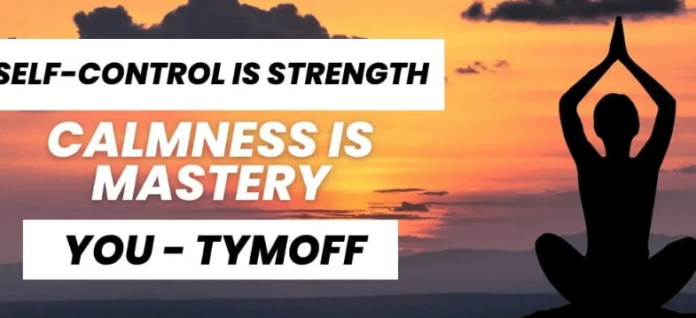In an era where the pace of life accelerates relentlessly, the ancient virtues of self-control and calmness are more pertinent than ever. The phrase “Self-control is strength. Calmness is mastery. You – Tymoff” encapsulates a profound philosophy that, if internalized, can transform not just individual lives but society at large. This article delves into the essence of this philosophy, exploring its roots, implications, and practical applications in the modern world.
The Foundation of Self-Control
Self-control, at its core, is the ability to regulate one’s emotions, thoughts, and behaviors in the face of temptations and impulses. It’s a marker of inner strength, a bulwark against the storms of desires, and a stepping stone towards achieving long-term goals. But why is self-control equated with strength? The answer lies in its power to enable individuals to make choices that align with their values and long-term objectives, rather than succumbing to fleeting desires.
Psychological Perspectives
From a psychological standpoint, Self-control is strength. Calmness is mastery. You – Tymoff often understood through the lens of the dual-system theory. This theory posits that human decision-making is governed by two systems: an impulsive, automatic system that seeks immediate gratification, and a reflective, deliberative system that considers long-term consequences. Strengthening self-control involves training the mind to favor the reflective system, a feat that requires both understanding and effort.
The Role of Willpower
Willpower is a critical component of self-control. It’s the mental energy used to focus on long-term goals despite short-term temptations. However, research has shown that willpower is a finite resource that can be depleted. This concept, known as ego depletion, suggests that the strength of one’s self-control can vary from day to day, depending on various factors such as stress, fatigue, and emotional state.
Calmness as Mastery
Calmness, or the ability to maintain a state of emotional and mental stability amidst chaos, is described as mastery for good reason. It represents a higher level of psychological and emotional development, where an individual can face challenges, stressors, and provocations without losing their composure. This state of inner peace is not just a sign of emotional intelligence; it’s a powerful tool for navigating life’s inevitable storms.
The Power of Equanimity
Equanimity, or the evenness of mind under stress, is a central concept in many philosophical and spiritual traditions. It denotes a state of calmness and composure that does not fluctuate with external circumstances. Achieving equanimity allows individuals to approach situations with a clear mind, make rational decisions, and maintain emotional balance, thereby enhancing their mastery over themselves and their surroundings.
Techniques for Cultivating Calmness
Cultivating calmness involves various practices that focus on the mind-body connection. Meditation, mindfulness, deep breathing exercises, and yoga are among the most effective methods for developing a calm demeanor. These practices not only reduce stress but also enhance self-awareness, allowing individuals to recognize and manage their emotional responses more effectively.
Integrating Self-Control and Calmness into Modern Life
In today’s fast-paced world, integrating self-control and calmness into daily life may seem daunting. However, the principles of “Self-control is strength. Calmness is mastery. You – Tymoff” offer a blueprint for personal development that is both timeless and profoundly relevant.
Building a Foundation with Habits
Developing habits that foster self-control and calmness is essential. This could involve setting specific, achievable goals, creating routines that reinforce discipline, and practicing stress-reduction techniques regularly. Over time, these habits can strengthen the neural pathways associated with self-control and calmness, making them more accessible and natural responses to life’s challenges.
Embracing Challenges as Opportunities for Growth
Viewing challenges as opportunities rather than obstacles is a mindset shift that can significantly enhance one’s ability to maintain self-control and calmness. This perspective encourages resilience, fosters a growth mindset, and helps individuals learn from their experiences. By embracing challenges, people can strengthen their inner resources and enhance their capacity for self-regulation and emotional stability.
Read also The Urgent Need for intensive outpatient program in Dallas
Conclusion
The philosophy embodied in the phrase “Self-control is strength. Calmness is mastery. You – Tymoff” offers a roadmap for personal development that is as challenging as it is rewarding. It acknowledges the complexities of human nature while providing a clear direction for cultivating a life of purpose, fulfillment, and tranquility. As individuals strive to embody these virtues, they not only enhance their own well-being but also contribute to the creation of a more compassionate, resilient, and mindful society.
In conclusion, self-control and calmness are not just personal virtues but societal assets. They are the keys to unlocking our fullest potential, enabling us to navigate the complexities of modern life with grace and purpose. As we journey through the tumultuous seas of existence, let us remember that self-control is the rudder, calmness the sails, and our inner strength the compass. Together, they guide us towards our destination: a life of mastery, meaning, and profound inner peace.


